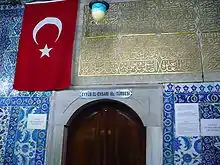Ansari (nesba)
Al-Ansari or Ansari is an Arab community, found predominantly in the Arab and South Asian countries. It originated in Medina since the time of Muhammad. The Islamic prophet himself bestowed it as a title to the tribesmen of the city, for their keen support and dedication towards Islam. This title was later used as a surname by the descendants of these tribes, who then spread across the Middle East, Persian Gulf and the Indian subcontinent with the spread of Islam. The meaning of the word 'Ansari' is supporter, the community are known as Ansari, as well as Alvi (mixed with the descendants of Ali), Momin, Saudagar, Sheikh and Sayyid (mixed with the descendants of Muhammad).
الأنصار | |
|---|---|
 | |
| Regions with significant populations | |
| Arab world, Turkey, South Asia, Iran | |
| Languages | |
| Arabic, Turkish, Gujarati, Urdu, Persian,Hindi | |
| Religion | |
| Islam |
| Part of a series on |
| Sunni Islam |
|---|
 |
|
|
The Ansaris are Muslims of the Sunni sect. Historically, the community produced the sage, scholars and philosopher. The Ansari are an Urdu-speaking community, although the Ansari clan of Gujarat have Gujarati as their mother tongue.[1]:984
Notable Ansaris
Medieval
- Abu Ayyub al-Ansari, a prominent companion of Muhammad
- Ansari ( other companions of Muhammad)
- Sa'id ibn Aws al-Ansari (died 830), Arab linguist and narrator of hadith
- Yaqub ibn Ibrahim al-Ansari (d.767), Hanafi Muslim Jurist and scholar
- Abu al-Qasim al-Zahrawi (936–1013), also known as Albucasis, Arab Muslim physician and surgeon who lived in Al-Andalus
- Alāʾ al‐Dīn ʿAlī ibn Ibrāhīm al-Ansari (1304–1375), also known as Ibn al-Shatir, prominent Arab astronomer and instruments maker.
- Khwaja Abdullah Ansari (1006–1088), Perso-Arab mystic and poet, and one of the descendants of Abu Ayyub al-Ansari
- Shams al-Din al-Ansari al-Dimashqi (1256–1327), Syrian Arab geographer
- Zakariyya al-Ansari (1420–1520), Egyptian Sufi mystic
Modern
- Khwaja Muhammad Latif Ansari, scholar and descendant of Khwaja Abdullah Ansari, the descendant of Abu Ayyub al-Ansari
- Morteza Ansari (1781–1864), Shia jurist from Dezful, Iran
- Muhammad Mian Mansoor Ansari (1879–1946), Indian freedom fighter, Hero of the Silken Letters Movement-1904-1916, diplomat, jurist, political scientist Deoband-India, Kabul-Afghanistan, Ankara-Turkey.
- Abidullah Ghazi, (1936-), Indian-American Academician, syllabus developer, author, Chicago, Illinois, USA.
- Rashid Ahmad Gangohi, (1839–1905). Indian Islamic scholar, jurist, academician, freedom fighter in 1857 War of Independence. Gangoh, Uttar Pradesh, India.
- Abdulrahman al-Ansary, (b. 1935), Saudi Arabian archaeologist.
Naats in Islam
- Tala' al Badru 'Alayna Tala‘ al-Badru ‘Alaynā (Arabic: طلع البدر علينا) is a traditional Islamic song known as nasheed that the Ansar sang to Muhammad upon his arrival at Yathrib after completing the Hijra[2][3] in 622 CE.[4] The naat is currently over 1400 years old, and one of the oldest in the Islam.
See also
References
- K. S. Singh, People of India Uttar Pradesh, Volume XLII Part Two. Manohar Publications
- "Archived copy". Archived from the original on 22 July 2012. Retrieved 10 March 2015.CS1 maint: archived copy as title (link)
- https://www.webcitation.org/5jAB7IvbO?url=http://lifeandtimesblog.wordpress.com/2008/10/30/talaal-badru-alayna/ 2F30%2Ftalaal-badru-alayna%2F&date=2009-08-20
- http://www.islamicity.com/mosque/ihame/Sec2.htm
Further reading
- Ghazi, Muhammad Tariq Al-Ansari. "Tazkar ul Ansar" (ISBN 1-56316-922-3) Biographical Encyclopedia (2018). Iqra Education Foundation, Mumbai, India (www.iqraindia.org).